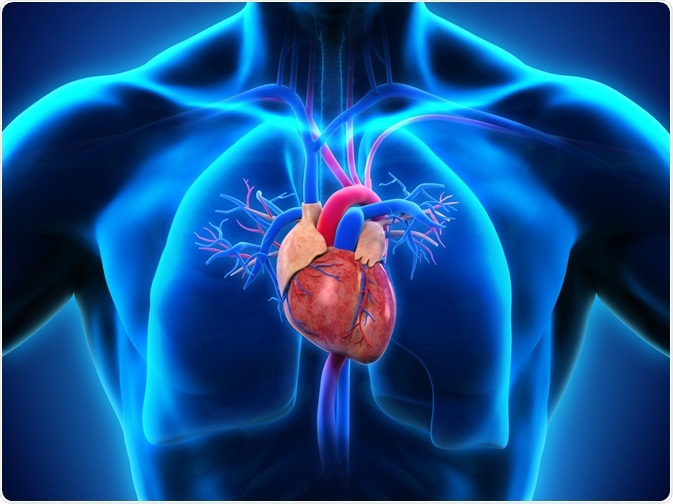As it is high in protein and contains lots of vital nutrients, like iodine, selenium, and vitamin D, it is well known that fish is one of the healthiest foods. It is also a source of long-chain omega-3 polyunsaturated fatty acids (3-PUFAs) which are crucial for cardiovascular health and brain function1.

Image Credit: Shutterstock/Nerthuz
So, it is recommended that fish is included in the diet regularly in order to minimize cardiovascular disease risk factors2.
Yet, the results from observational studies do not give a clear association between cardiovascular disease risk factors, like body mass index (BMI) and blood pressure and fish intake. More research is required to define the influence of dietary fish on cardiovascular risk accurately.
Fish and cardiovascular health
The advantageous cardioprotective effects of a fish diet were first reported in a study in Tanzania3. A lower prevalence of hypertension was seen among subjects eating 300–600 g of freshwater fish a day compared with those on a vegetarian diet.
Yet, in their findings regarding the cardiovascular benefits of dietary fish intake, meta-analyses of the data from prospective studies have been inconsistent. One stated that dietary fish intake consistently decreased blood pressure4.
Another demonstrated that dietary fish did not influence blood pressure, although higher n–3 PUFA levels were correlated to lower blood pressure5. Mitochondrial efficiency has also been reported to grow with lean fish consumption, which in turn may promote lipid catabolism6. Yet, there have been no reports on the influences of fish intake on body weight.
Although there is a lot of data showing a beneficial influence of fish intake on cardiovascular risk, there is a requirement for objective biomarkers of fish intake to supply consistency and allow the comparison and consolidation of data between studies7.
Metabolic profiling
Metabolic profiling is the method which is most commonly utilized to facilitate the identification of objective biomarkers for the influences of diet8. Defining metabolic markers of fish intake could allow the collation of more robust data with and without fish intake, which could make it viable to elucidate the underlying mechanisms giving rise to positive cardiovascular health outcomes.
It would be beneficial to have urinary biomarkers of fish intake in particular, in order to permit non-invasive monitoring in observational studies. A number of serum biomarkers for fish intake have been identified, including 3-PUFAs, polychlorinated biphenyls, and methyl mercury as metabolic markers9.
Yet, more research is required to confirm urinary biomarkers. More confirmatory data detailing the precise relationship is required10,11 even though some studies have proposed taurine, trimethylamine-N-oxide (TMAO), and 1-methylhistidine as potential urinary biomarkers of fish intake.
NMR evaluation of the effects of fish consumption
The relationships between urinary metabolites, fish consumption, and cardiovascular markers have been assessed recently in nearly 5000 men and women (aged 40–59 years) who took part in the International Study of Macro-/Micronutrients and Blood Pressure (INTERMAP) study (NCT00005271)12.
Using a Bruker Avance 600 spectrometer at 300 K, proton nuclear magnetic spectroscopy (1H-NMR) was conducted on 24-hour urine samples. Fish intake was established from four 24-hour dietary diaries and on eight occasions, blood pressure, height and weight were measured.
Three predominant metabolites associated with fish intake were discovered – taurine, TMAO, and homarine. Although the data gathered in this study confirm that TMAO is a urinary biomarker of fish intake, it should be used with caution as TMAO can also be an indirect urinary biomarker of egg and red meat consumption.
It is generated through the oxidation of trimethylamine, which is released during the metabolism of eggs and meat by gut microbiota. Fish intake was not discovered to have a significant effect on blood pressure. Among Japanese participants, body mass index (BMI) exhibited a direct association with fish intake.
Notably, the converse was seen for urinary TMAO, which was directly associated with BMI for participants from all regions other than Japan. Similarly, an association between TMAO and diastolic blood pressure was not found in Japan, but was found among western populations.
So, it is suggested that associations between fish intake and its biomarkers and health outcomes, blood pressure and BMI are context specific. These region-specific differences need further investigation to establish if they arise because of differences in dietary patterns and/or gut microbiota.
The direct association which was seen between fish intake and BMI in the Japanese population sample is contrary to previous findings in European studies and could show an effect of ethnicity or regional differences in measurement techniques.
Furthermore, the latest research identified homarine, which is a metabolite found in the muscle of shellfish, as a novel potential urinary biomarker of shellfish intake. This finding needs further validation in future observational studies and controlled feeding studies.
This observation will contribute to the incremental advancement towards the discovery of objective dietary biomarkers if it can be replicated and validated in future studies.
References
- Weichselbaum E, et al. Nutr Bull 2013;38:128–177.
- Van Horn L, et al. Circulation 2016;134(22):e505–e529.
- Pauletto P, et al. Lancet 1996;348(9030):784–788.
- Chowdhury R, et al. BMJ 2012;345:e6698
- Yang B, Shi MQ, Li ZH, Yang JJ, Li D. Nutrients 2016;8(1):58.
- Schmedes M, et al. Mol Nutr Food Res 2016;60(7):1661–1672.
- Jayedi A, et al. Public Health Nutr 2018;21(7):1297–1306.
- Mancano G, et al. Curr Opin Food Sci 2018;22:145–152.
- Guertin KA, et al. Am J Clin Nutr 2014;100(1):208–217.
- Sagara M, et al. Adv Exp Med Biol 2015;803:623–636.
- Manor O, et al. Cell Rep 2018;24(4):935–946.
- Gibson R, et al. Am J Clin Nutr 2020;111:280–290. https://academic.oup.com/ajcn/article/111/2/280/5645625
About Bruker BioSpin Group
The Bruker BioSpin Group designs, manufactures, and distributes advanced scientific instruments based on magnetic resonance and preclinical imaging technologies. These include our industry-leading NMR and EPR spectrometers, as well as imaging systems utilizing MRI, PET, SPECT, CT, Optical and MPI modalities. The Group also offers integrated software solutions and automation tools to support digital transformation across research and quality control environments.
Bruker BioSpin’s customers in academic, government, industrial, and pharmaceutical sectors rely on these technologies to gain detailed insights into molecular structure, dynamics, and interactions. Our solutions play a key role in structural biology, drug discovery, disease research, metabolomics, and advanced materials analysis. Recent investments in lab automation, optical imaging, and contract research services further strengthen our ability to support evolving customer needs and enable scientific innovation.
Sponsored Content Policy: News-Medical.net publishes articles and related content that may be derived from sources where we have existing commercial relationships, provided such content adds value to the core editorial ethos of News-Medical.Net which is to educate and inform site visitors interested in medical research, science, medical devices and treatments.